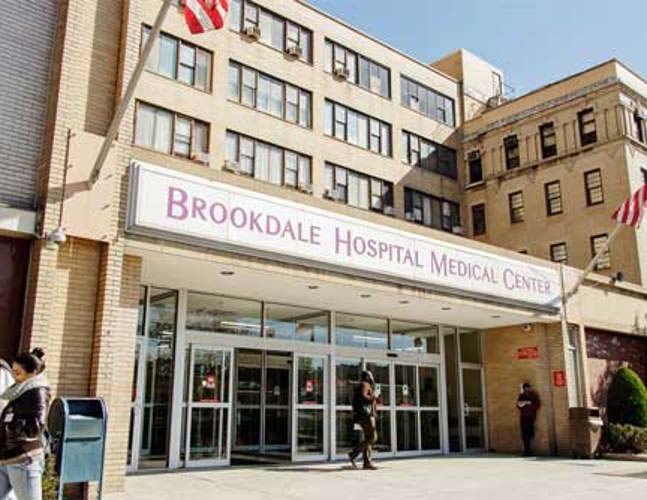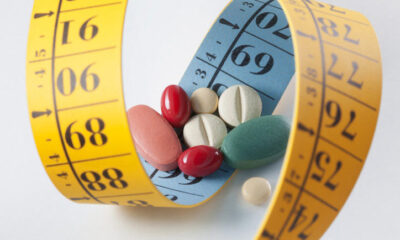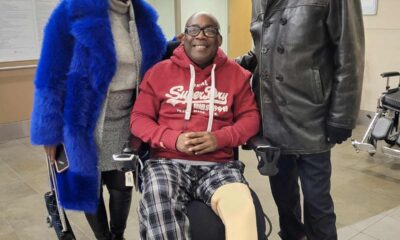Health & Wellness
It’s Diabetic Awareness Month,Here are Some Ways to Help

By Nayaba Arinde
Editor-at-Large
Sugar. That’s the name ole folks used for someone with the all too common – diabetes.
This sugar is not so sweet. It can affect a person’s quality of life in all manner of ways – sight, vision, mobility, etc…
Certain ailments afflict the Black community, perhaps disproportionately. Hypertension, asthma, cancers, and diabetes are some of them.
One Brooklyn Health (OBH) is celebrating Diabetes Awareness Month on Tuesday, November 14, 2023, at the Diabetes Center of Excellence at the Pierre Toussaint Health on Eastern Parkway, Brooklyn.
OBH consists of Brownsville’s Brookdale Hospital Medical Centers, Crown Heights/Bedford Stuyvesant’s Interfaith Medical Center, and Kingsbrook Jewish Medical Center.
OBH’s Diabetes Center of Excellence is inviting the community to participate in their upcoming event featuring “conversations surrounding diabetes, patient testimonials, and new programs that can assist you and your loved ones in the fight against diabetes.”
Grandma, gramps, moms, pops, and sometimes the children can get stricken with diabetes Type 1 and 2, excess sugar in the blood, which can lead to serious health challenges.
Young children and teens can get Type 1 diabetes; more common is Type 2, which folk can get at any age, but often people 40-plus find them suddenly diagnosed. The Mayo Clinic reported that Type 2 diabetes is now increasing in children.
Methods intended to head off, or reverse diabetes of course, include medication, but there is also diet.
All the tasty carbs are a no. Or a small portion.
Thanksgiving.
Kwanzaa.
Christmas.
Avoid excessive amounts of potatoes, rice, mac and cheese, candied yams, or pasta. And as for those pies, Pattie’s or your mama’s…Sweet potato, pecan, even pumpkin, that’s also a no! And the bread…..
etc.
Greens you can/should have. Legumes and lentils. Not all restrictive news then!
Of course, there are a variety of different strength medications.
Helping diabetic patients “achieve their highest level of health,” the OBH Diabetes Center of Excellence has an interdisciplinary team made up of a Board-certified endocrinologist, a Diabetes Care and Education Specialist (DCES) registered nurse, a nurse practitioner dedicated to the care of diabetes and metabolic disease, Doctor of Pharmacy for medication management, and Health Coaches.
Brookdale Hospital Medical Center’s Diabetes Care and Treatment at the Medication Management Clinic has experienced PharmDs and primary care providers, and their Diabetes Self-Management Program and a Diabetes Prevention Program.
In addition, Interfaith Medical Center’s Bishop Walker Health Center also offers Diabetes Self-Management Group Programs, a Medication Management Clinic, and treatment services.
Dr. Gwen Lewis from the Interfaith Bishop Walker Family Care Center, spoke to Our Time Press about their Diabetes programs.
Based on the number of patients they are seeing, she said that they have “developed several programs to support better control of diabetes with the patients that we serve. We have our health coaches who are certified in Diabetes Self-care Management – the Stamford University program, and they were certified through Healthfirst.”
The Center has a program called Living Healthy with Chronic Diseases. The good news is they are now doing it virtually so more people can participate, and because of the new post-COVID protocols.
They also have a Remote Patient Monitoring program for patients who are living with uncontrolled diabetes, “an AIC greater than 9, which could result in further complications.”
They give out glucometers and finger sticks to check blood sugar three or four times and blood pressure devices so that the doctor can monitor them, as well as the health coaches, to see if there is any pattern and, if so, medication, counseling, and coaching can be done, “so they can regain control of their blood sugar.”
Jessica Joseph, manager of the Diabetic Wellness Program located at Brownsville Culinary Center, said “Brownsville has the highest incidents of diabetes throughout all of New York City. There is a definite increase in onset of diabetes in both Type 1 and Type 2. I was speaking to a doctor from SUNY Downstate about a specific strain of Type 2 that has been identified in The Little Caribbean, Brooklyn. So that was particularly interesting.”
Asked about the increase in cases across the board, Ms. Joseph said, “It’s with more food processing, lower economic opportunities, lack of access to equitable healthcare, there’s going to be an increased rate of diabetes.”
Even more disturbing, she added, “We have folks who are coming in younger that are saying they are diabetic. We are hearing stories of folk who are saying they have developed gestational diabetes, and you’d think that once they had delivered the child, the diabetes would reverse, but they are still diagnosed with diabetes.”
Ms. Joseph states that the increase in the numbers of people getting diabetes has many causes, and “As we move into a more sedentary lifestyle, and we recognize more consumption of processed food, and we’re taking more medication that has an adverse effect, and now you may have uncontrolled blood sugar as well. Lack of education around diabetes also plays a part. I would say genetics, but I feel that is very broad, but it does influence onset diabetes.”
Food Apartheid and Diabetes
A cause not discussed enough, Ms. Joseph told Our Time Press, is “All the social determinants of health: lack of safe housing which influences people’s ability to go outside and exercise. There are so many direct and indirect things. Quality of food, people living in a food desert – the term in the last couple of years seems more derogatory in the community around nutrition and food access. In the way it is framed, it is like the community is barren; it does not highlight the system and the structural issues that influence it.”
Ms. Joseph said, “Food Apartheid means there is a structural reason why folks have inadequate access to good food. It’s all by design. In Brownsville we have a lot of food deserts; you won’t find a Trader Joe’s or a Whole Foods ever.”
Solutions?
With a background in the nutritional sciences, Ms. Joseph offered that personal lifestyle changes can be effective:
“What is our relationship with food? Maybe make some dietary adjustments. Education first, and maybe more initiatives in large clinics and hospitals with programs on a local, state, and federal level – that incentivizes folks to eat healthier.”
The community has to be more intentional about the education of diabetes. There must be, she said, a multi-faceted approach to tackling diabetes.
Interfaith has a one-stop shop for other common comorbidities with its Chronic Disease Self-Management Program, Dr. Lewis said. “Some of our diabetics have other comorbidities – they may be obese, or they may have cardiovascular disease, asthma, hypertension…sickle cell.”
They treat the illnesses which affect a patient’s quality of life.
Interfaith Bishop Walker Family Care Center’s Dr. Lewis said proudly, “We’ve been approached by the Department of Health, and they are willing to advertise our group sessions in barber shops and beauty parlors and things like that, so the community is aware of other resources available to them.”
So they can get many services under one roof. We have social workers to work with patients who present with depression and mild or moderate anxiety.”
The community can join the Chronic Disease Self-Monitoring Group by contacting the health coaches and Chronic Disease Managers at 718 613 6837.
One Brooklyn Health Diabetes Awareness Month on Tuesday, November 14, 2023, at the Diabetes Center of Excellence at the Pierre Toussaint Health (1110 Eastern Parkway, Brooklyn).













